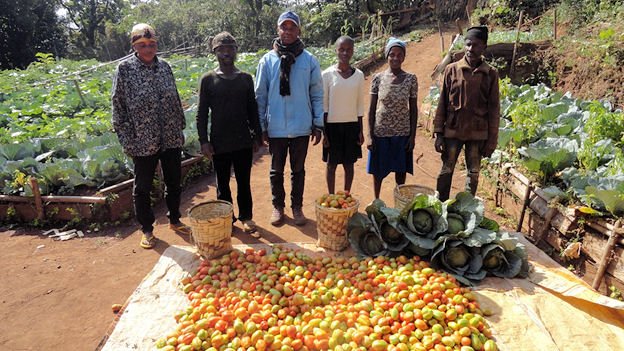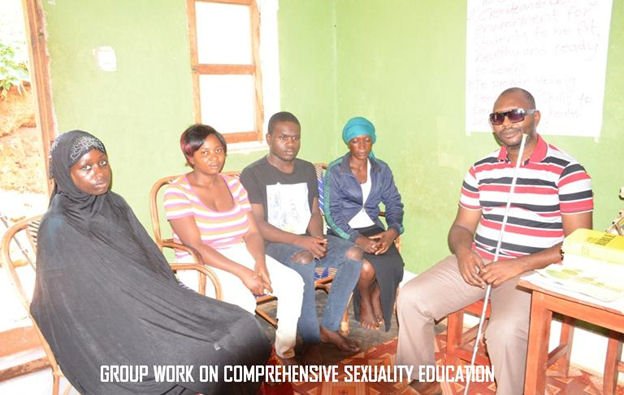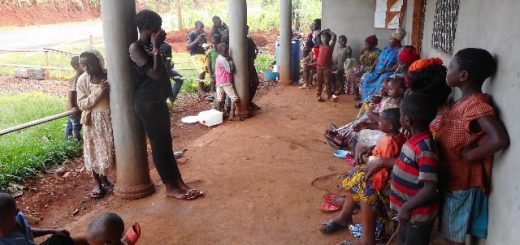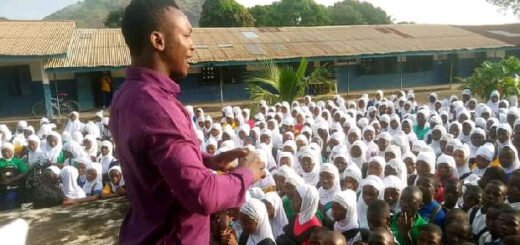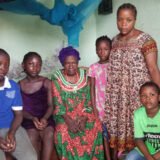Integrated Agricultural Association
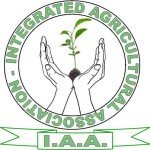
Integrated Agricultural Association (I.A.A) is a Cameroonian non-profit, non-sectarian and apolitical Organization founded on the 5th of March 2016 by the founder Dungrila Pascal Mbimenyuy to promote social, economic, and environmental well-being by:
(i) helping to create “sustainable economic development in rural communities in Cameroon,
(ii) empower and train youths and women-owned producer cooperatives, and
(iii) educate Cameroonians about the importance of organic farming and organic food.
I.A.A is a Youth led Organization with a main focus on empowering farmers through organic food production and commerce.
I.A.A also transforms subsistence farms into profitable businesses by helping smallholder farmers access good training, affordable capital, quality inputs and better crop prices.
I.A.A is passionate about creating social change and has over two years of experience in nonprofit leadership with a focus on smallholder farmer empowerment, defending indigenous minority rights, education, health care and community development.
Specific Objectives.
To build and strengthen the capacities of peasant farmers through local trainings on cultivation and marketing techniques.
- To ensure the greater involvement of the youths in agriculture through sensitization, trainings and support.
- To promote innovative ideas among farmers which are concerned with soil management.
- To alleviate poverty by working in collaboration with communities and implementing programs and projects that increase their income through the encouragement of collective production and marketing among farmers.
- To strive for socio-economic empowerment of the disadvantaged farmers and other community member groups through improved agriculture.
- To promote farming practices that lead to sustainable agriculture and meet the needs of small scale farmers. That is, discouraging the use of chemicals and encouraging natural farming.
Area of Action: North West, Southwest and West Regions of the Republic of Cameroon and beyond.
Target Groups: Peasant women, Children, Youths, Farmers and Persons living with disabilities.
Values
- Competence
- Accountability
- Justice and equity
- Democracy
- Citizenship
- Responsibility
- Admissibility
Approach
We seek to meet our objectives in two different ways. The kinds of approaches we use are as follows:-
- Participatory approach.
We Provide an enhanced and alternative local livelihoods, including sustainable agriculture and value-added products to support local economies, which engages all stakeholders in the community and other development groups. We foster civic engagement of communities through creative facilitation and other methods of stakeholder involvement (such as, public meetings and community-mapping exercises). - Systematic approach.
We collaborate with like-minded organizations worldwide and create possible partnerships, which can help us mobilize resources needed to address community challenges. These include financial, human and material resources. We collaborate with technicians and development agencies as well as community development associations to help us attain our objectives.
PROGRAMMES:
Integrated Agricultural Association (I.A.A) is working under eight different programme areas which include:
AGRICULTURAL TRAINING AND DEVELOPMENT.
I.A.A helps to transform subsistence farms into profitable businesses by helping smallholder farmers access good training, affordable capital, quality inputs and better crop prices. She also launches food safety awareness raising campaign to educate the public in nutrition.
Many farmers’ livelihoods are stable but vulnerable. When working with these communities, we use conservation agriculture techniques and territorial value-chain development. The goal is sustainable growth while building stronger production and marketing groups, and creating market links between producers and buyers. Our approach enables farmers to access and manage financial services and improve their use of natural resources. We also strengthen the capacity of farmers and field agents to help them plan businesses and evaluate profitability. With our experience, farmers can connect better to markets and use technologies that raise yields. To help farmers and field agents succeed, we developed a digital tool kit called ICT4Ag Suite which facilitates training, business planning, and monitoring and evaluation, making it easier for farmers to grow their businesses.
METHODS USED.
Territorial approach to value-chain development: We work with farmers to identify and develop products that have potential for local, regional and national markets. We emphasize improving farmers’ production and market opportunities, but we work to improve the entire value chain so it will function more efficiently for all stakeholders. This process increases production, strengthens services for business development, improves post-harvest utilization and builds better market engagement.
Conservation agriculture: In response to global climate change, we help farmers learn techniques for conservation agriculture, which is the foundation of climate-smart agriculture. Techniques include using cover crops, planting with green manure and “no till” practices, conserving water and using native varieties of crops to manage pests. These approaches increase productivity, decrease costs and improve soil fertility.
ENVIRONMENTAL PROTECTION AND MANAGEMENT. We organize meetings to raise awareness of the importance of protecting the local environment and adopting strategies to deal with a changing climate. We carry out tree planting exercises and train local groups and families to establish tree nurseries to supply tree seedlings to the local community, with the aim to foster community engagement in afforestation. We train more than 5,600 people each year in tree planting and care and work with school children to educate them on the importance of trees to the environment and the value of agro-forestry. We also conserve biological diversity, indigenous forests and maintain ecosystem services (water, soil, and carbon sequestration).
EDUCATION AND CAPACITY BUILDING.
We provide scholarship opportunities for children from low income families and marketable skills for those with special needs.
We provide vocational training to children with disabilities and support them with equipment to set up workshops that will enable them to be economically self-reliant, participate in community activities and be socially recognized.
We promote ICT and quality education both in urban and rural communities by equipping schools with computers and books libraries, construction and equipping school classrooms as well as the provision of sanitation equipment and water.
HEALTH EDUCATION.
In Cameroon the rural population does not have access to quality health care and services. The situation remains the same in public hospitals everywhere in the country. The rural population travel an approximate distance of 25 kms or more just to have medical attention, while those visiting public hospitals complain about poor approach by medical personnel. I.A.A strives to overcome these health disparities by training community health workers, building the capacities of hospital personnel, refurbishing and constructing community health facilities and offering nursing scholarship to rural youths especially those coming from poor families.
WATER AND SANITATION.
In Cameroon, water crisis has become the order of the day both in urban centres and rural areas. This is a critical issue that affects mostly women and their children which have had severe consequences on their lives, notably; education and health. Children stay away from school just because they don’t want to carry water on their head every day. And women travel 5 kms or more to fetch dirty water. I.A.A provides access to safe and clean water (water pumps and distribution systems, well drilling, bore holes, spring capping).
HUMAN RIGHTS.
I.A.A is working to advocate for peace through peace building initiatives and humanitarian response, defending children against trafficking, early marriages and forced labour and ensuring that the rights and dignity of women, children and persons living with disabilities are protected and fulfilled.
WOMEN EMPOWERMENT.
Women are often marginalized, less educated, lack access to finances, collateral security and are not always able to participate in decision making processes locally. Opportunities on entrepreneurship, capacity buildings and access to land are always limited. Where these facilities are available, they are not reliable, affordable and accessible. They suffer from domestic violence and their girls fall victims of child trafficking and early marriages. These situations are common in rural areas in Cameroon and elsewhere in the world. I.A.A is empowering women with micro- business skills and supporting them with startup loans for new businesses and improve existing ones. I.A.A assists women with entrepreneurial skills through micro-business training and financing so that they can be able to build wealth for their families and participate in nation building.
APICULTURE
Bees are important insects that play an important role in the environment by increasing ecosystem services through pollination. It remains imperative to understand and manage pollination services; farmers in rural communities have the potential to substantially increase their crop yields and income, as well as safeguarding micronutrient supplies from foods such as fruits, nuts and vegetables. This has important implications for food security, poverty alleviation and global health. However, promoting bee farming increases pollination services and provide progress towards several important UN Sustainable Development Goals. It is important that development and environmental outcomes are closely aligned, such that there is a long-term sustainability. Beekeeping, pollination and ecological farming are important goals of development and environmental protection.
APICULTURE AND FOREST GOVERNANCE PROJECT
We train forest communities in sustainable forest management. Many of these communities depend on agriculture for their livelihood which often results in the destruction of the forest for farm land. We train these communities in bee farming and foster their engagement in aforestation as alternatives to protect the forest and fight poverty. We provide opportunities for rural people in tree nursery management, planting and care, and in agro-forestry techniques. I.A.A. distribute forest seeds, agro-forestry seeds and bee farming materials as well as locally manufactured bee hives to vulnerable people. The goal of this project is to promote apiculture as a strong financial incentive for rural people to alleviate poverty and protect biodiversity.
The objectives of this project are as follows:-
(1) Teaching beehive construction, apiary set-up and maintenance, honey harvesting and tree-planting.
(2) Establishment and capacity building for community-based beekeeper cooperatives.
(3) Establish a honey shop and marketing hub; give advice and training about honey marketing.
EXPECTED OUTCOMES.
- Improved honey-based livelihood opportunities.
- Community led sustainable management of honey bees.
- Increased levels of understanding of different issues relating to honey bees from biological, economical, policy and social viewpoints.
SEXUAL AND REPRODUCTIVE HEALTH PROJECT
In Kumbo, Secondary school girls become pregnant as a result of lack of understanding about family planning. This is also because the information on reproductive health is not widely disseminated for better access by young girls and women of reproductive age. School girls’ records show poor academic performance as a result of menstruation. During this period, these girls stay away from school because of stigmatization and lack of basic menstrual hygiene information and the school administration do not make available a safe environment for these girls to take care of the menstrual situation with dignity. Married women deliver children too close as a result of lack of reproductive health information and family planning which result in poor health, and unsafe abortions. I.A.A has designed this project to increase access to reproductive health information among school girls and the women of Kumbo.
I.A.A set-up workshops throughout Kumbo with different groups of individuals in order to discuss reproductive health, and address the questions of the participants. The workshops involved secondary school students (one for male students and one for female students), sex workers, and local communities. For each workshop, every effort is made to make the participants feel that they are in a safe environment.
All workshops usually start with an open question session to answer the sexual health questions of all participants. In addition to these workshops, radio talk shows are held in local languages, which also include a call-in question and answer session.
PROJECT GOAL.
The overall goal of this project is to increase access to reproductive health information by providing young people with the knowledge and skills to promote their health and well-being as they mature into sexually healthy adults.
OBJECTIVES.
- To work with community leaders to widely disseminate reproductive health information among young girls and women.
- To increase access to comprehensive reproductive health services.
- To address stigma and discriminatory social norms related to menstrual hygiene management with health providers, media, parents, teachers and wider community stakeholders.
Integrated Agricultural Association
Foncha Street, Nkwen, Bamenda
Nw Region, Cameroon, Central Africa
EMail: integratedagriculturalass@gmail.com
Tel (+237) 682 v98 51


